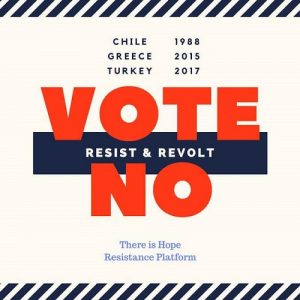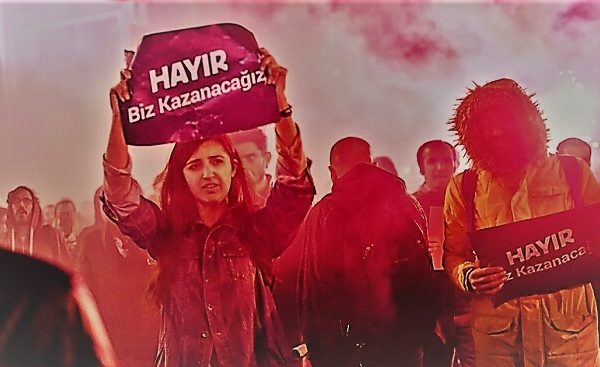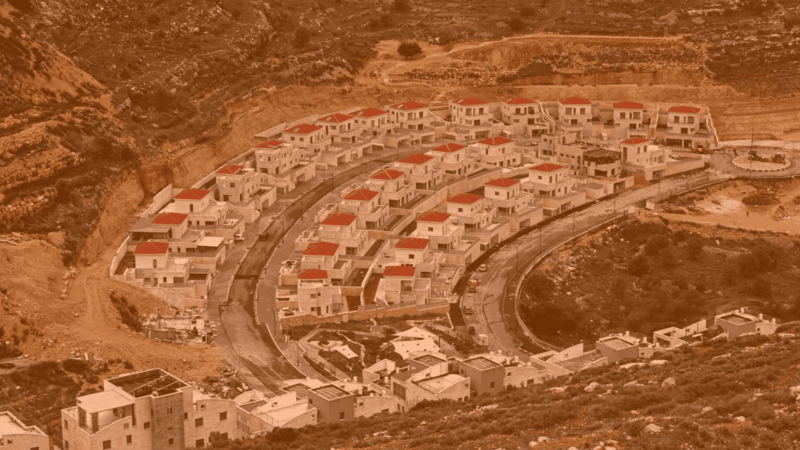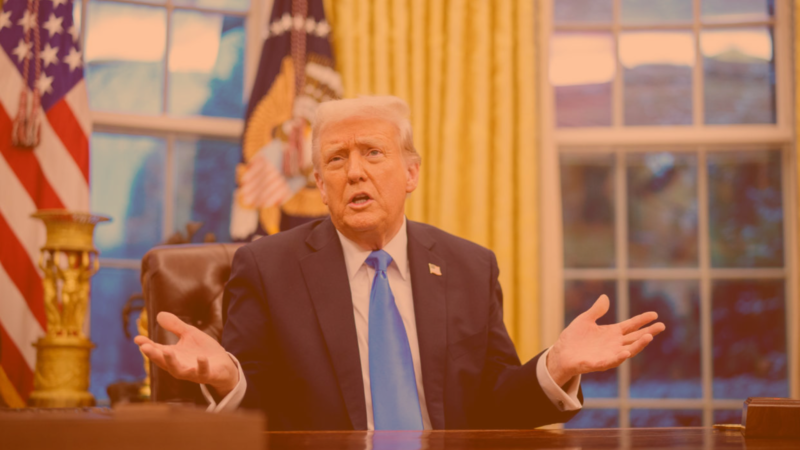How we got here
The situation in Turkey during the time before the referendum could well be described as a Chronicle of a Death Foretold . Erdogan used July’s failed coup attempt as an excuse to unleash a fierce manhunt against anyone standing in his way. Students, scholars, journalists and citizens who opposed his regime were targeted , suspended, beaten up, tortured. Newspapers and businesses belonging to the opposition were forced to close and the general atmosphere was poisoned with fear and suspicion. For years now Kurds and leftists have been intimidated by the government. Now the same was true for democrats and liberals who dared to criticize the regime.
Fear and loathing in the voting center
In the actual referendum day, things got from bad to worse. In the regions where ‘’No’’ was predicted to prevail ,soldiers were sent to patrol inside the voting centers obviously to intimidate voters. AKP representatives were caught cheating . At times forcing Syrian refugees to cast a vote that was handed to them by AKP members, at times casting Yes votes by the dozens themselves, governing party members made an absolute mockery of a democratic procedure. Premade ballots full of fraud Yes votes were counted , military vehicles patrolled Kurdish neighborhoods ,and even internet connections were cut off to stop all this mess from getting known to the rest of the world.
But resilient Turkish democrats found ways to resist. Mobile videos showing clearly all the fraud tactics used by Erdogan’s representatives have already gone viral. With most of its leaders in jail, HDP openly called out the fraud. Even conservative politicians like Meral Axener resisted to the transformation of the Turkish republic into Erdogan’s one man rule. The most active resistance though came from the feminist movement. Women in Turkey protested against AKP, painted the word ‘’No’’ on their bodies and hanged purple pieces of cloth out of the windows as a sign of opposition to the government. They know very well that women are the first victims when societal regression and authoritarianism prevail, and showed they are having none of it.
European leaders in bed with the Sultan
EU officials now speak out against the authoritarian tactics but it really sounds like crying over spilt milk. For a long time now the Turkish regime saw that salaries in Turkey were kept low, and as this is the only investment criteria of many big European firms operating in Turkey, he was the man for the job and EU officials looked the other way when they were told about the oppression in Turkey. Also during the refugee crisis, Erdogan played his cards with Merkel because he knew they needed him. They needed him because they feared to fight the anti-immigrant rhetoric inside the EU, therefore they wanted to pass the problem to somebody else. Conveniently enough, Turkey became a safe place to send (actually throw) immigrants back to. Now that everybody sees Erdogan as who he really is, the EU bureaucrats act surprised. But they are responsible for ignoring human rights violations just to serve petty politics.
Consequences
Major human rights organisations warn that situation can get harder. Turkish intellectuals call out the international community to stay alert in front of a drama being unfolded before our own eyes: the transformation of Turkish parliamental democracy into despotism. Erdogan’s monopoly of powers in combination with the re-introduction of the death penalty, will have as a result more terror for anyone opposing the regime.
What about Greece?
In contrast with nationalists who always say ‘’beware the turks’’ we see a deeper danger. We say ‘’beware despotism’’. Although we know that authoritarian governments usually tend to imperialism as well, we don’t see an arms race as something that will act against such potential tendencies of Erdogan’s regime.
We see Turkish people’s fight for democracy and freedom as our own common fight. We can relate to the Turkish people not only because of our cultural understanding and neighboring relations. We can relate because we have also been victims of disrespect towards people’s will. Not only in the past with the military junda but also recently after our own referendum. Here, fraud wasn’t in the ballot and soldiers stayed in their camps but in essence, the result of the referendum was not respected by the EU leadership and unfortunately the greek leadership succumbed to this injustice. That lead to pessimism and despair for the greek people and there is the danger: when people feel their voice can not be heard by the government, the road to authoritarianism has opened.

So we have a double duty: First to stand firmly by our Turkish brothers and sisters who fight for democracy and help their voice be heard throughout the world. In the meantime, we also have to fight against apathy and despair here and start a democratic and peaceful movement that will force the elit to respect the people’s will.
Fighting for democracy is the only way towards peace and prosperity and that is a fight we are willing to have side by side with European and Turkish citizens together. Let a European movement of solidarity and unity be our weapon against authoritarianism.
Do you want to be informed of DiEM25's actions? Sign up here















